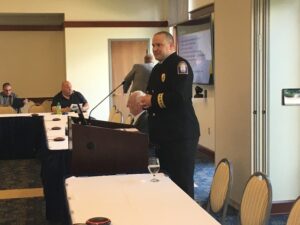
(c) MetroNews (Charleston, W.Va.)
Visit MetroNews and view this article here!
By Mike Nolting
May 22, 2022 - 4:21 pm
MORGANTOWN, W.Va. — State lawmakers heard details of current challenges faced by some EMS organizations during the first interim meeting in Morgantown Sunday.
There’s an invisible crisis, Sen. Ron Stollings, D-Boone said.
Ron Stollings
“They work so hard and put forth so much effort to make sure every emergency is handled that to the general public everything seems ok, but it’s not,” Stollings said.
Monongalia EMS Executive Director Forest Weyen said volunteer EMS services have closed in Preston and Greenbrier counties and the unit that served Star City in Monongalia County also shuttered due to financial and staffing issues.
“There’s one here in Monongalia County less than a mile from where you’re sitting that closed in the last few months,” Weyen said. “They were a great service, but due to the constraints that happened they were unable to maintain operations and it’s happening around the state.”
Weyen wants lawmakers to find new ways to fund the departments or increase current allocations.
Most ambulance services in the state are either non-profit or private corporations and unlike police and fire departments the units receive little funding from state and local governments in most cases. State code orders county commissions to fund emergency medical services to the degree they can afford it.
Many counties, including Monongalia, do provide additional funding for EMS services.
Many volunteers left the service during the pandemic. Emergency service workers feared bringing the deadly virus home and had difficulty adjusting to extensive personal protective equipment requirements. But, the biggest problem on the radar is compensation, according to Weyen.
“There’s a local hardware store in town that’s paying $17, $18, $19 or $20-per-hour when I post a job for an EMT for $16,” Weyen told lawmakers. “They close at 6 p.m. and we’re open 24-hours-a-day.”
Weyen said finding ways to collaborate and regional services would also help smaller more rural areas of the state.
The governor authorized $10 million from the American Rescue Plan to help deal with some of these issues.
Del. Clay Riley, R-Harrison, said a portion of the money will be used to configure five ambulances as training and recertification mobile classrooms. Also, the money will fund an EMT training course at the Monongalia County Technical Education Center(MTEC). MTEC Director Greg Dausch said they will train 100 EMTs by late fall and the training is 100% paid for, including uniforms and testing fees, by federal relief money. The training is provided by WVU and the Shirley M. Kimble Training Center.
The lawmakers will get the first look at the specialized vehicles later this summer at another interim legislative session.
“Part of this $10 million will be going to providing additional training, being able to set up some mobile labs and get out into these rural areas so it’s not centralized,” Riley said.
Del. Joe Statler, R-Monongalia, chairman of the Committee on Fire Departments and Emergency Medical Services urged his counterparts to consider remedies and push hard during the interim process to address the problems.
“”We are in crisis, I don’t think there’s any doubt about it,” Statler said. “We are losing services around the state and we have got buckle down as a committee in the upcoming session.”